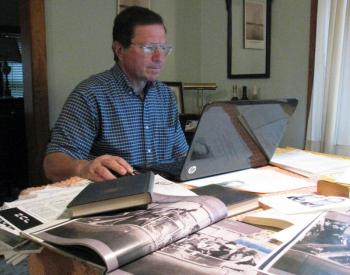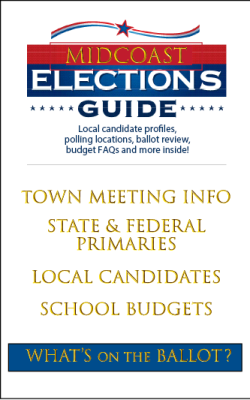Friendship legislator tracks JFK killers
FRIENDSHIP — Today, he's a legislator. Back in 1967, he was a 14-year-old kid sitting in his family's living room, watching a New Orleans district attorney explain on national TV how the Warren Commission got it wrong.
President John Kennedy was not killed by a lone gunman, D.A. Jim Garrison asserted then, but rather by a conspiracy of players with ties to the CIA, Cuba and the Mafia. The young Geoffrey Evangelos, now 60 and a first term legislator representing House District 49 (Cushing, Friendship, Union and Warren), listened and learned.
As the nation marks the 50th anniversary of the assassination, Evangelos looks back on 35 years studying and thinking about that watershed event, and he has settled into a confident knowledge about what happened.
Tom Groening is editor of The Working Waterfront, published by the Island Institute.
And what happened matters greatly, he and others believe. Just as South Africa and Chile have faced their past national sins, Evangelos, a former town manager for Warren and business administrator for the SAD 40 school district believes the U.S. should have it own "truth and reconciliation" moment, perhaps by granting immunity to some of the players. After all, he noted, someone who was 30 at the time of the shooting is now 80.
DARK SHADOWS
The shadow cast over the course of American history by the Kennedy shooting is long and dark, Evangelos argues, and the shooting itself was born from powerful national and international political tensions.
Adhering to an investigative ethic fitting for the son of a lieutenant in the Massachusetts State Police, Evangelos has concluded that a rogue group of CIA agents, and not Lee Harvey Oswald, killed Kennedy.
It's not a theory, Evangelos hastens to say. It's a conclusion based on a voluminous public record of evidence—evidence that has grown incrementally and quietly over the five decades since that fateful day in Dallas.
In essence, he argues, the pieces of the puzzle are scattered across the years, but if someone takes the time to put them together, a clear picture emerges. The evidence, finally, is in plain sight.
OFFICIAL CONCLUSIONS
During a visit to the 1850s Cape Cod home he shares with his wife just outside the fishing village of Friendship, Evangelos has the pieces of the puzzle quite literally scattered across the surface of his dining room table. There are photocopies of news stories from the 1960s and '70s. There are copies of what are purported to be memos from the FBI and CIA.
But the dominant source of information is the government. Evangelos owns the entire 27 hardcover volumes of the Warren Commission report, and the report generated by the House Select Committee on Assassinations.
The Warren Commission, convened days after assassination, concluded that Oswald acted alone. The House committee, convened in 1976, concluded it was likely that Kennedy was killed by a group of conspirators. The committee wanted the matter referred to the Department of Justice, Evangelos said, but with the election of Ronald Reagan as president in 1980, the inquiry languished.
Much of what he posits on the Kennedy killing is argued by James Douglass in his 2008 book, JFK and the Unspeakable: Why He Died and Why It Matters. Evangelos urges those interested in the story to read the book.
Robert Kennedy, Jr., the son of the late president's brother, has concluded that it was a conspiracy, not a lone gunman, and has said that his father, while publicly accepting the Warren Commission's version, privately suspected larger forces were behind the assassination.
A 1977 Washington Post story reported that Lyndon Johnson told his aide Marvin Watson in 1967 that he believed the CIA was involved in the JFK killing. Watson noted the president's offhand comment in a memo shared with the FBI. The memo was released in 1977 along with 40,000 pages of documents related to the assassination.
E. Howard Hunt, a one-time CIA agent and later key player in the Watergate scandal, recorded an interview with his son shortly before his death in 2007, corroborating much of what Garrison and others allege.
In November, Secretary of State John Kerry told NBC News he doesn't believe Oswald acted alone.
"The truth has been right in front of us, fragmented," Evangelos said.
And he has done no small amount of investigating of his own. He has spoken face-to-face with former CIA agents and others involved, directly or indirectly, all insisting he keep their names private.
"I asked a retired CIA agent of 32 years, now deceased, if he believed the evidence I had uncovered regarding the coup. He paused and said, 'The anger within the agency was palpable after the 2,000 attacking fighters were left on the beach [at the Bay of Pigs] in Cuba. There was outrage and anger and many operatives believed the President had betrayed them.' That's how he put it."
In 1993, Evangelos traveled to Washington D.C. with two briefcases stuffed with documents to meet with then-Senate Majority Leader George Mitchell about his conclusions.
He has a clipping from the Boston Globe that same year showing him in a photograph and news story about a demonstration demanding justice for Kennedy outside a federal building in Boston named in his honor. Interestingly, he notes, then-President Bill Clinton gave a 30-second statement in the White House press briefing room that night, attesting to his support for the Warren Commission's findings.
CIA ANGLE
In the Acton, Mass., home in which he grew up, Evangelos and his family revered President Kennedy. And when the president was killed, they struggled to understand.
In 1967, NBC broadcast a program laying out the conclusion that Oswald acted alone. Garrison, who sort of stumbled into the investigation, Evangelos said, demanded equal time and got it. (Garrison was the central figure in Oliver Stone's 1991 film, "JFK.")
In the July 15, 1967 rebuttal, Garrison said the president was killed "by men who sought to obtain a radical change in our foreign policy," particularly in relation to Cuba. He called the Warren Commission's explanation a "fairy tale."
"I'll never forget it," Evangelos said. "We watched it live in our living room."
The explanation that many have embraced is that the killing is linked to Cuba. A CIA-planned invasion of the Soviet-backed communist nation by Cuban exiles had been finalized during the last days of the Eisenhower administration. Kennedy was asked to endorse it, and did, but failed to approve U.S. air power to support the attack.
The Bay of Pigs invasion failed miserably, and many in the CIA blamed Kennedy. Cuban leader Fidel Castro, fearing another attack, sought Soviet protection, and nuclear missiles aimed at the U.S. were established there. The Cuban Missile Crisis brought the U.S. and Soviet Union to the brink of nuclear war.
It's not hard to imagine CIA operatives—Evangelos and others identify those working in the agency's Miami office—concluding the nation's survival hung in the balance. And, as Evangelos alleged, the CIA has been implicated in the overthrow of foreign regimes, including Syria in 1949, Iran in 1953, Guatemala in 1954 and Iraq in 1960. Killing the U.S. president is shocking, he conceded, but perhaps possible to rationalize by men convinced they were saving the nation.
In addition to the Cuban connection, Evangelos believes Kennedy signed his death certificate in a June 23, 1963 speech at American University. In it, the president called for working toward normalized relations with the Soviets, "declaring the end of the Cold War," he said.
"He said the Russians had lost 21 million people in World War II and that it was time to move on to a peaceful relationship. And that, really, was the final nail in his coffin. That, and his overture to end the Vietnam War," he said.
Documents declassified in recent years reveal that Kennedy and Soviet leader Nikita Khrushchev had over 50 back-channel contacts aimed at easing tensions after the missile show-down, Evangelos said.
Kennedy also signed an executive order that would have begun winding down U.S. involvement in Vietnam, which in 1963 was mostly limited to advising and training.
"President Kennedy was killed because he turned toward peace," he said.
ODDS AND ENDS
Perhaps one of the oddest twists in the JFK story—and, as he explained it, yet another sort of confirmation of the CIA involvement—is tied to Watergate. Evangelos noted that the Democratic headquarters burglars were from Miami and had CIA ties. In the Watergate tapes, President Richard Nixon makes repeated references in the early days after the burglary to "the Cuban thing" and "the Bay of Pigs thing." Nixon hoped that the FBI and other agencies would come to his aid in covering up the break-in for fear of legal and press inquiries bringing the facts on the assassination to light, Evangelos said.
The references to Cuba were code for the assassination, he said, an assertion also made by Hunt.
Digging into the JFK killing unearthed some odd facts. George H.W. Bush was in Dallas, speaking to an oil-drilling group two days before the assassination. Nixon was there the day of the shooting, flying out of Dallas that morning.
Evangelos also believes many of the same players who killed Kennedy were responsible for the assassinations of Martin Luther King and Robert F. Kennedy.
"Nov. 22, 1963 remains the biggest lie ever told by our nation," he said. "We suffered a classic coup d'etat, never have admitted it or gone through redemption." President Dwight Eisenhower, in his farewell address, "warned the nation" about the military industrial complex exerting undue political influence, "and no one listened. We've suffered the consequences ever since."
There is a way to find the truth, Evangelos believes.
"The best way to get to the bottom of it is follow the same process that Chile and Argentina have followed open up the records, have an honest examination, grant immunity. In South Africa they did it, they had a truth and reconciliation commission. If you agreed to come forward and tell the truth, you were forgiven."





























